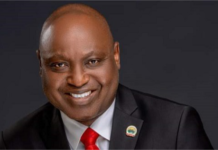- More African migrants enter U.S. through Mexico
By Jeph Ajobaju, Chief Copy Editor
More Africans, including those from the East Coast without historical ties to the United States, are joining South Americans to enter the U.S. through the Mexican border, most of them fleeing poverty and hunger.
Educated and highly skilled Nigerians are also heading abroad in huge numbers, generally not because of hunger, but to realise middle class ambitions in stable environments.
In the brain drain are academics, accountants, lawyers, doctors, and nurses seeking to insure a better life for themselves and their children.
A good number of the estimated eight million Nigerians in the diaspora have lived in the United Kingdom for decades, the UK being a historically preferred foreign destination, dating back to the days of colonialism, on the fulcrum of English as a common language.

In Britain there are currently 6,312 medical doctors of Nigerian origin, according to data on the U.K. General Medical Council website, a 44 per cent increase on 2015 figures.
But, instead of going to the UK, Nigerians are also heading across the Atlantic to Canada, and that is not necessarily because of Brexit.
Life in the U.S. is seen to be better. But getting in is tougher. Canada is friendlier and – facing skills shortage – actively seeks foreign students and professionals.
Canada’s liberal immigration policy is a strong pull for Nigeria’s top talent that faces rising living costs and stagnant incomes, Bloomberg reports.
Inflation has been at double digits since 2015, while the unemployment rate has hit its highest level since 2010.
Applications for permanent residency in Canada have risen threefold since 2015, data from Immigration, Refugees and Citizenship Canada show. Those for temporary residency has almost doubled over the same period.
Over 4,200 Nigerians were approved for permanent residency in Canada in 2017, almost double the number from 2016.
Contributions, home and abroad
Nigerians in Canada make important contributions to both countries. They provide professional services in Canada and remit money home to friends and relatives.
Some have even gone into politics and public service.
On April 30, Kelechi Madu, a law graduate from the University of Lagos, took the oath of office as Minister of Municipal Affairs in Alberta, Canada.

Kelechi, popularly known as Kaycee, emigrated to Canada in 2005 with his wife and enrolled in postgraduate studies at the University of Alberta.
He was one of the 22 new cabinet members whom Alberta Premier, Jason Kenney, swore in at the Government House in Edmonton.
He is a member of the United Conservative Party (UCP).
Kaycee had earlier been elected this year to the Legislative Assembly of Alberta representing Edmonton South-West. He was sworn in as a lawmaker on May 21.
He is serving as both Minister of Municipal Affairs of the Province of Alberta and a Member of Parliament representing Edmonton South-West.
The ministry is the third largest in Alberta with over $3.7 billion portfolio.
Kenney, who also took the oath of office on April 30 as Alberta Premier, reiterated in a statement that “Kaycee is a committed conservative, a lawyer, and a father of three.
“Prior to coming to Canada with his wife, Emem, Kaycee graduated from the law school and was subsequently called to the bar in Nigeria.
“He has since established a law firm in Edmonton where he continues to practice.
“Kaycee enjoys giving back to the community and volunteers his legal skills with the Law Society of Alberta Lawyer Referral Program and the Edmonton Community Legal Centre (ECLC).
“He … supports his community league activities and his church.
“Kaycee’s legal expertise and his unique understanding of the challenges faced by newcomers to Canada make him a valuable member of the United Conservative team as we work to present Albertans with a common-sense alternative to the NDP (New Democrat Party).”
Struggling economy
Per capital income in Nigeria has dipped 37 per cent since its peak in 2014 and is projected to continue declining in the next four years, according to the International Monetary Fund (IMF).
Nigeria’s economy has struggled since oil crashed four years ago.
The exodus in the nation of 190 million people is hitting the IT, finance, consumer, and health industries particularly hard.
“Those who emigrate can time-travel,” said Charles Robertson, chief economist at Renaissance Capital.
“They jump forward decades of economic development to work in countries which are usually more stable, wealthier, with better education for their children and better health care.”
Visa overstay in U.S.
The number of Nigerians suspected overstaying in the U.S. with visitor visas has more than quadrupled from 2015 to 2018, according to data from the U.S. Department of Homeland Security.
The overstay rate of Nigerian students studying in the U.S soared to 22 per cent in 2018 from 4 per cent in 2015.
Of about 155 countries that have citizens overstaying in the U.S. as non-immigrants with business and pleasure visas, Nigeria ranks among the top 10 which include Djibouti, Eritrea, Yemen, South Sudan, Syria, Chad, and Burundi.
Almost 30,000 Nigerians admitted with business and tourist visas are overstaying in the U.S as of 2018.
The health care industry is one of the most affected by the exit of professionals from Nigeria. About 9 out of 10 medical doctors in practice are exploring work opportunities abroad, a 2017 survey by polling company NOI Polls shows.
That has worsened health care in a country that has one doctor to serve 5,000 people, according to the Nigeria Medical Association (NMA).
“All professional firms and major corporations in Nigeria are affected by the brain drain,” said Andrew S. Nevin, advisory partner and chief economist at PwC Nigeria.
“The Nigerian government needs to create an economic and social environment sufficiently attractive to keep our educated young people.”
From Congo-Brazil-Mexico to U.S.
Each year, down the Canadian border in the U.S., officials at Catholic Charities of San Antonio assist thousands of migrants entering the U.S. through the southwest border.
Catholic Charities, a social justice and community services organisation, focuses on meeting the physical needs of people in this historic southcentral Texas city.
With few exceptions, the migrants are overwhelmingly from Latin American countries, according to Quartz Africa Weekly.
But in recent months, they have noticed a rising trend of more Africans joining Central Americans in attempting to enter the U.S. through its southwest border.
In three weeks in June alone, Catholic Charities received between 30 and 40 African migrants each day – significantly higher than what they previously saw, says J. Antonio Fernandez, President and CEO of Catholic Charities of San Antonio.
These new arrivals are from the Democratic Republic of Congo and Angola – two countries with no strong historic ties to the U.S.
Most of them report fleeing extreme poverty and violence.
DR Congo and Angola are two of Africa’s resource-wealthy countries. But for decades, DR Congo has been dogged by corruption, misrule by its leaders, and violent ethnic conflicts.
In June alone, more than 300,000 fled the northeastern region of the country due to clashes between two groups, the Hema and the Lendu.
Angola, one of the world’s largest oil producers, experienced a brief economic boom earlier this decade. There is little evidence that the growth spurt trickled down to the general population.
A great many of the migrants follow a similar route.
They fly to Ecuador or Rio in Brazil before embarking by bus and by foot on the final leg of a trip that takes them through the jungles of Colombia, several Central American countries and into Mexico.
The process could take weeks, months or even years, and is often fraught with danger. Some cross the Rio Grande River near Del Rio, Texas.
“Yesterday I heard a story about a woman who’d been raped,” says Fernandez.
“One of the things we heard was how the rivers pose a threat. Cross the wrong way and you could get swept away,” adds Catholic Charities spokeswoman Christina Higgs.
Africans have entered the U.S through Mexico for several years. In the past, many came alone or accompanied by a single child.
But Fernandez says many of these newer arrivals are made up of families numbering four or five people.
In recent years illegal migration by Africans to Western countries is often associated with life-risking attempts to enter Europe by crossing the Mediterranean via Libya and the Sahara desert.
Going to Portland
The City of San Antonio has teamed up with Catholic Charities of San Antonio, the San Antonio Food Bank and the Interfaith Welcome Coalition to operate the San Antonio Migrant Resource Center.
The centre offers a vast array of services to migrants, including legal assistance, health checkups clothing and shelter. Nearly all of the migrants are bound for other destinations in the U.S. and typically leave San Antonio after a couple of days.
Most are bound for Portland, Maine, which has sizeable Congolese and Angolan communities. Catholic Charities has been assisting the migrants with bus tickets to their final destinations.
In two weeks in June, the centre saw approximately 375 African migrants, according to Roland Martinez, a spokesman for the City of San Antonio’s Department of Human Services.
In Portland, officials processed 292 African migrants representing a total of 87 families between June 9 and June 19, says city spokeswoman Jessica Grondin.
Quartz Africa Weekly reports that San Antonio and Portland are striving to find more French and Lingala (DR Congo) and Portuguese (Angola) speaking interpreters.
They have also worked to allay concerns that have been raised about the Ebola virus, which has affected regions of the Congo in recent months.
“We’ve been educating residents that they have been screened for any communicable diseases,” says San Antonio Councilwoman Ana Sandoval.
Both cities have poured considerable resources into assisting the migrants.
San Antonio has marshalled the resources of several of its agencies, including its library, police, fire, library and parks and recreation departments to provide a variety of services, including children’s activities.
In addition to shelter, Portland is providing three meals a day, legal assistance with immigration and laundry services. A team of nurses from the Centers for Disease Control is providing health care services.
So far, the new migrants have received a warm reception. In Portland, the city has received more than 1,100 volunteer requests.
Maine, a state with an aging population, is glad to see these new residents because they and their children will form an important part of the next generation of workers, says Grondin.
“The state is quite old, and the population numbers are not going up,” she adds.














